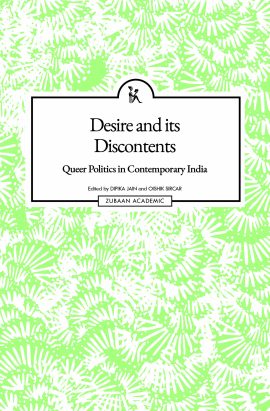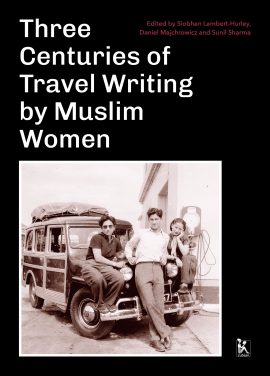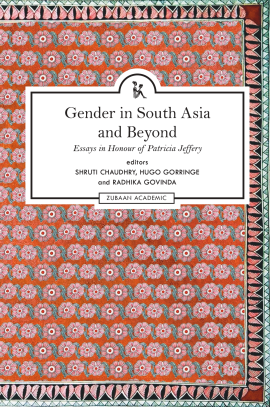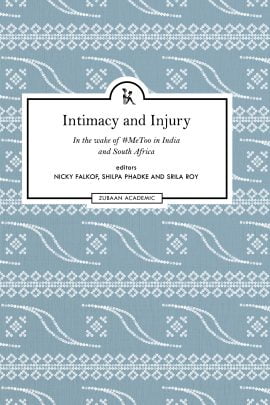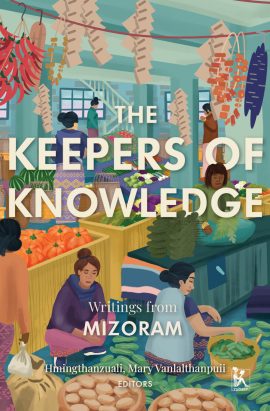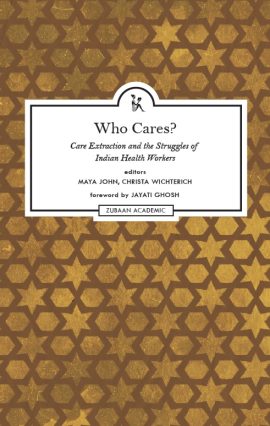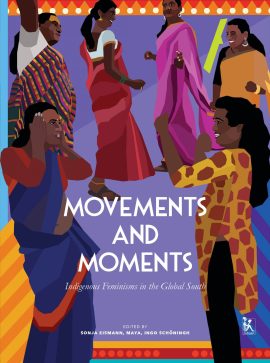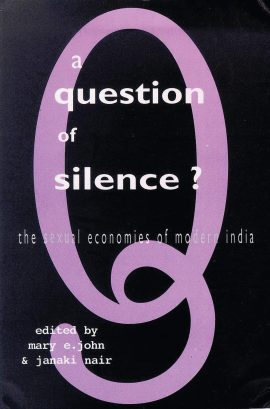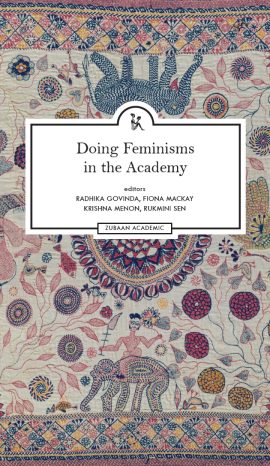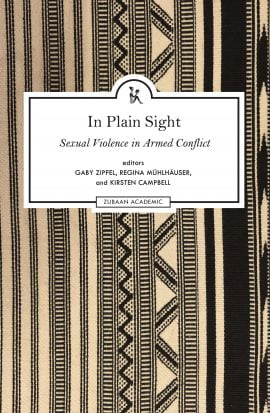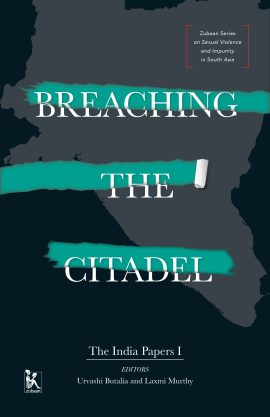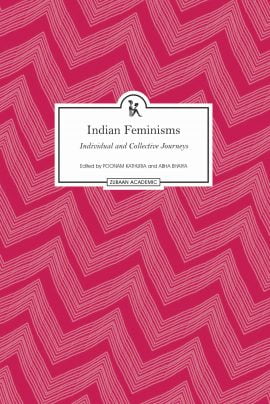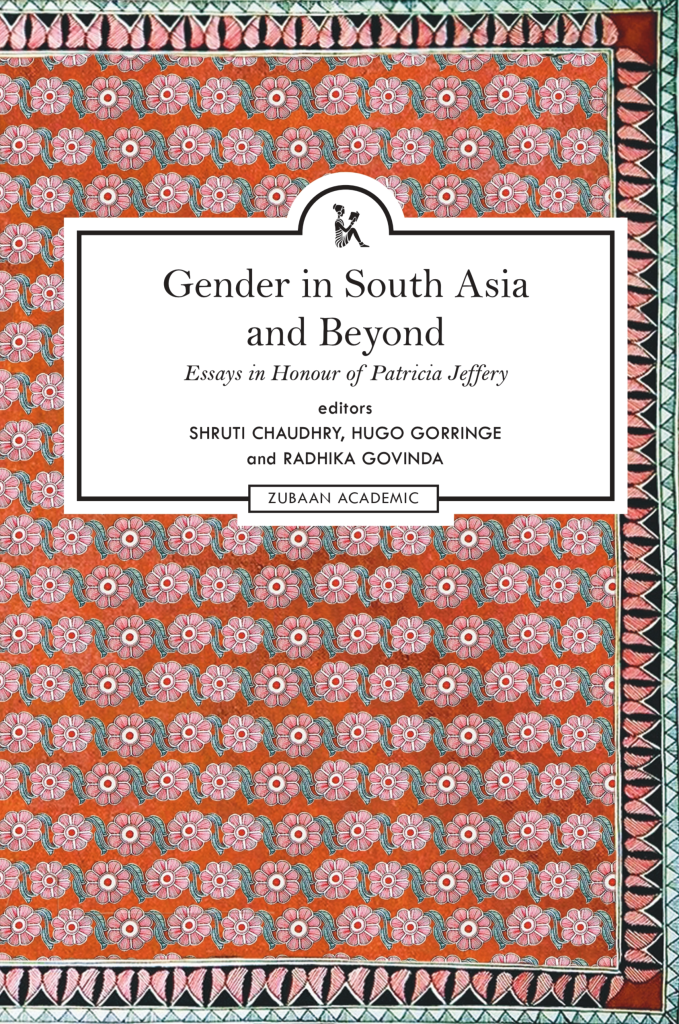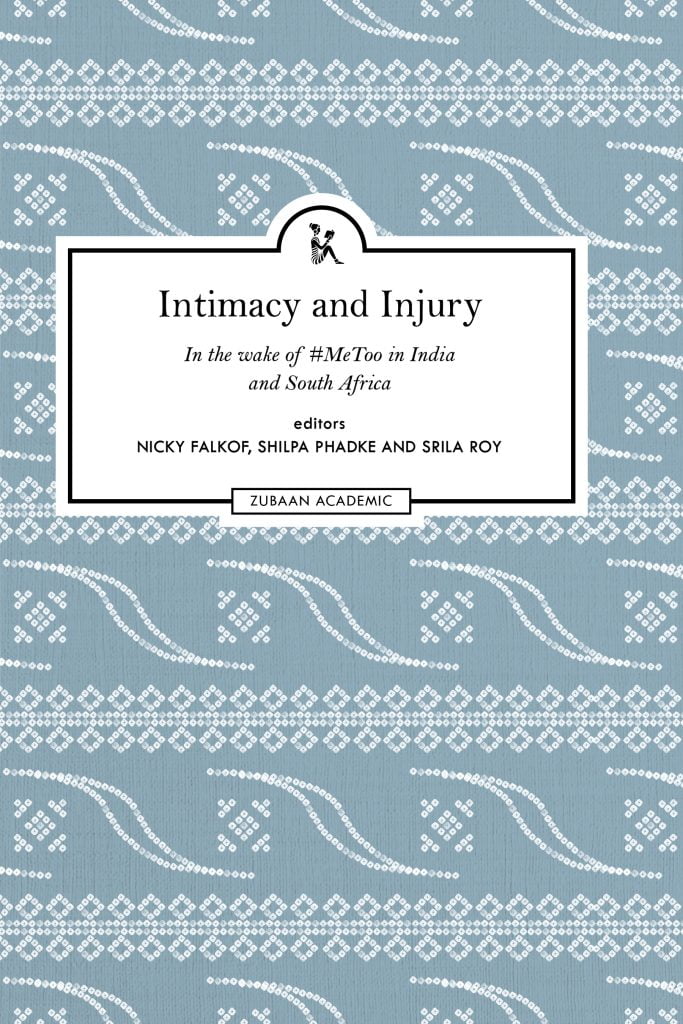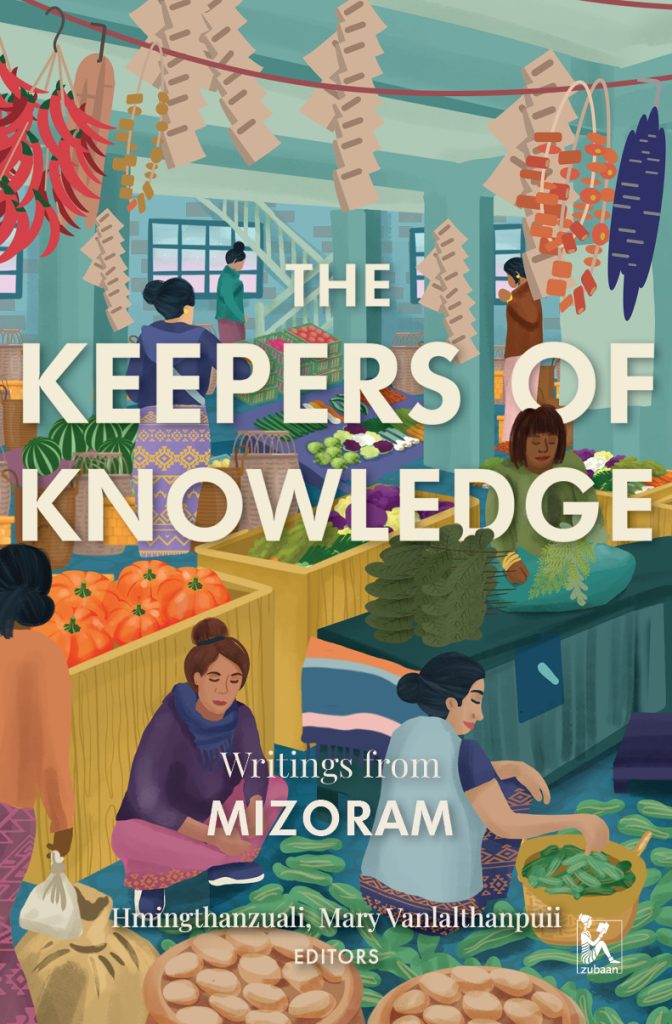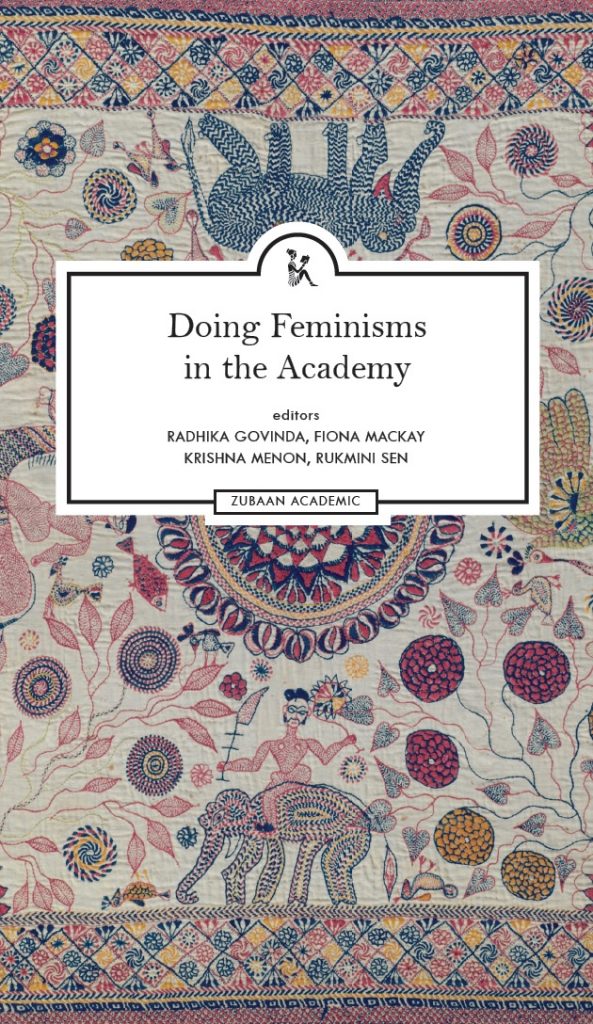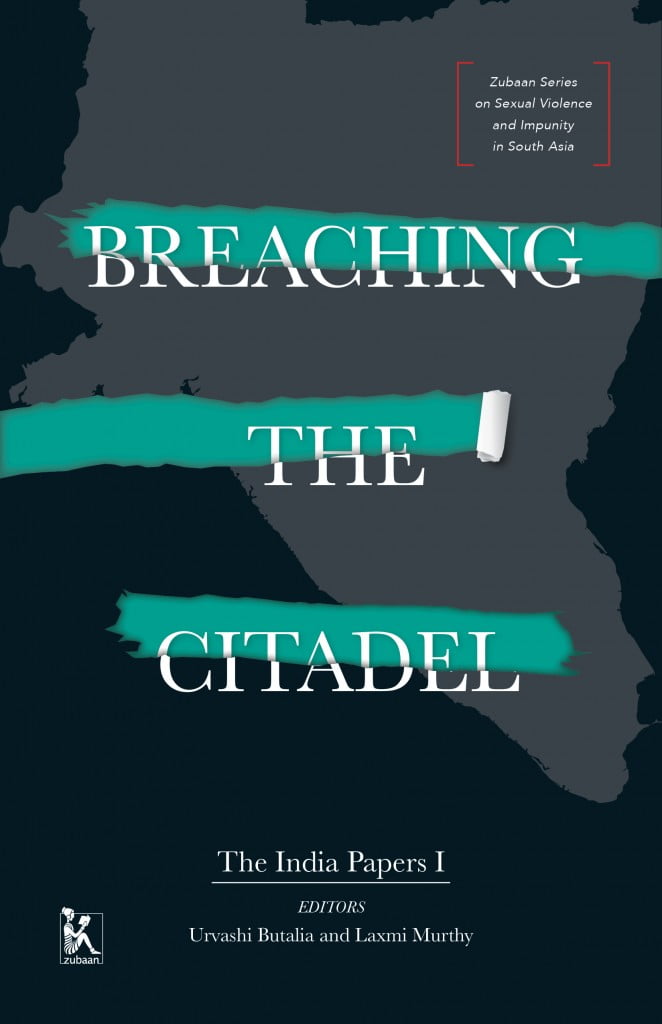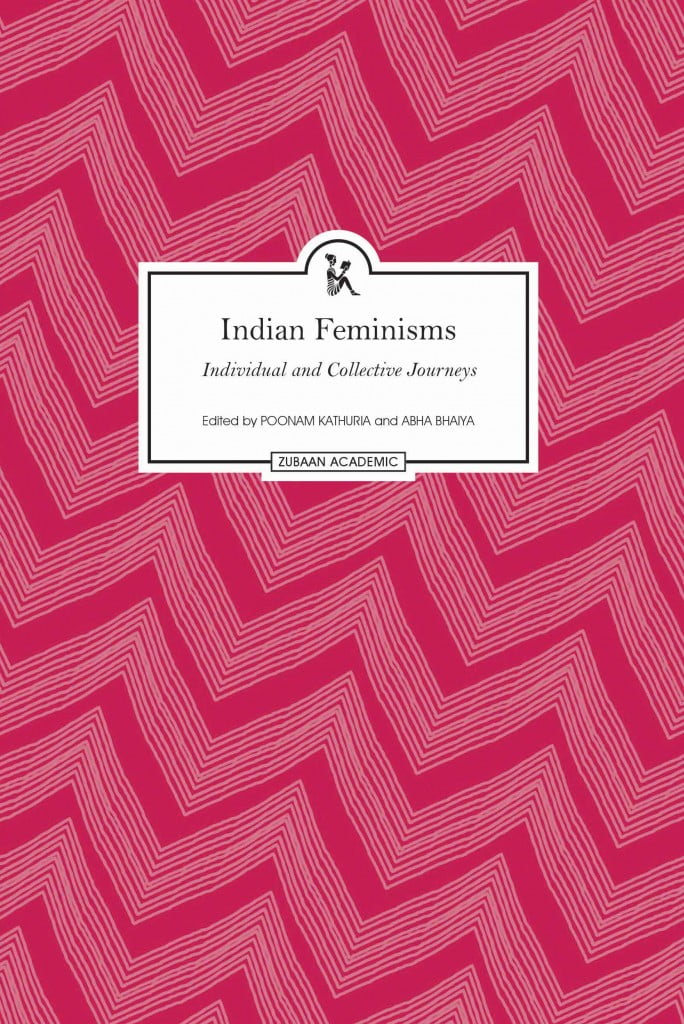No products in the cart.
Return To Shop
Log in / Sign in
Login
Register
Filter by price
Desire and Its Discontents: Queer Politics in Contemporary India
₹ 630 – ₹ 895Select format This product has multiple variants. The options may be chosen on the product pageGender in South Asia And Beyond: Essays in Honour of Patricia Jeffery
₹ 625 – ₹ 895Select format This product has multiple variants. The options may be chosen on the product pageThe Keepers of Knowledge: Writings from Mizoram
₹ 445 – ₹ 695Select format This product has multiple variants. The options may be chosen on the product pageWho Cares?: Care Extraction and the Struggles of Indian Health Workers
₹ 575 – ₹ 895Select format This product has multiple variants. The options may be chosen on the product pageA Question of Silence: The Sexual Economies of Modern India
₹ 250 – ₹ 445Select format This product has multiple variants. The options may be chosen on the product pageDoing Feminisms in the Academy: Identity, Institutional Pedagogy and Critical Classrooms in India and the UK
₹ 550 – ₹ 795Select format This product has multiple variants. The options may be chosen on the product pageIn Plain Sight: Sexual Violence in Armed Conflict
₹ 550 – ₹ 795Select format This product has multiple variants. The options may be chosen on the product pageSale
Breaching the Citadel: The India Papers I
₹ 488 – ₹ 850Select format This product has multiple variants. The options may be chosen on the product pageIndian Feminisms: Individual and Collective Journeys
₹ 495 – ₹ 695Select format This product has multiple variants. The options may be chosen on the product pageHas the queer movement’s politics in India escaped the combined onslaught of neoliberalism, Hindutva and brahminism? What has this triad done to queer politics in the wake of the ‘reading down’ of India’s sodomy law? Has the decriminalization of adult, consensual and private sex, depoliticized the queer movement? Is the queer movement immune to casteist, sexist and religious prejudice? In the aftermath of the failures and triumphs in the historic Naz, Koushal, NALSA and Navtej judgements of the Supreme Court of India, the essays in this volume engage in a counterintuitive interrogation of the prejudiced dimensions of the mainstream queer movement in India. The essays offer insights into the ways in which new forms of queer solidarities, mobilizations and imaginaries are resisting and subverting the movement’s tacit and overt alignments with neoliberalism, Hindutva and brahminism.
______________________________________________________________________________________
‘Too often, queer activists and scholars seeking emancipation through legal rights forget how much context matters, and how much law is committed to maintaining the very hierarchies that state power relies upon. Readers of this volume are unlikely to ever forget again. Contributors expose the exclusionary representations of queer legal subjects produced by recently celebrated judgements in the context of India, tracking myriad linkages to the right-wing, neoliberal, Hindutva agenda of the present government. Readers will emerge better equipped to continue the struggle for liberation wherever they are located.’
—Dianne Otto, Professorial Fellow, Melbourne Law School, The University of Melbourne
‘This uniquely caring anthology edited by Dipika Jain and Oishik Sircar at long last inaugurates an Indian critical queer theory, which is not a replica of the Euromerican approaches. Even as we welcome the decriminalization of gayness, we are asked to rethink beyond legal emancipation towards social emancipation—where there are very few subjects desiring neoliberalism. The struggles for a quest for queer politics constitute a response against the “violence and exclusions” of the triple enslavement constantly generated by forms, and forces of “Hindutva, neoliberalism and brahminism”. The “conditions of postmodernity” that further affect the “spectacles of emancipation” invite contemplation: how is an “embracing of the disruptive potential” of trans and gender non-binary identities, to create a “sustainable, radical politics, while simultaneously asserting the right to access state benefits?”. This book summons new futures beginning with a trans-constitutional renaissance.’
—Upendra Baxi, Emeritus Professor of Law, Universities of Warwick and Delhi
‘Dipika Jain and Oishik Sircar’s much anticipated second volume of essays extends their path-breaking original insights into the intimate entanglements of queer politics and neoliberalism. This volume too is poised to become nothing short of a classic, in bringing together some of the best-known voices on the politics of gender and sexuality. Turning their critical gaze to India, after the abrogation of Section 377, the essays offer refreshingly counter-intuitive analyses of such queer success and freedoms. In the aftermath of the decriminalization of homosexuality, the underlying nexus between Hindu nationalism, neoliberalism, casteism and queer rights has come fully to the fore. The volume provokes new ways to think of homonationalism and homocapitalism from this vantage point. Yet it is much more. From the relationship of queer to gender, caste, feminism and majoritarianism, to the transnational travel of Indian queerness to queering as a method, these remarkable interventions will singularly and together redirect our analytical and methodological impulses as well as reaffirm our political commitments to feminist queer worldmaking.’
—Srila Roy, Professor, Department of Sociology, University of the Witwatersrand
______________________________________________________________________________________
DIPIKA JAIN is Professor of Law, Vice Dean (Research), Vice Dean (Clinical Legal Education), and the Director of the Centre for Justice, Law and Society at Jindal Global Law School (JGLS), India. She served as a visiting faculty member at the Transnational Law Institute at Kings College London from 2017-2020. Her research was cited by the Supreme Court in the landmark decision of Navtej Johar v. Union of India (2018). In 2018, she was designated the first Research Professor at JGLS. In 2020, her research was cited in the legislative debate on abortion laws in the Indian Parliament. She has published in several prestigious journals, law reviews, and compendia internationally, and her work can be found at https://jgls.academia.edu/DipikaJain. She has consulted for the UNDP, Centre for Reproductive Rights (New York), ARROW, and IPAS Development on Reproductive Justice, Digital Health and Family Law. As the Director of CJLS, she has addressed various barriers in access to justice for marginalized persons in India.
OISHIK SIRCAR is Professor of Law at Jindal Global Law School, and an associate member of the Institute for International Law and the Humanities, Melbourne Law School. Oishik is the author of Violent Modernities: Cultural Lives of Law in the New India (Oxford University Press, 2021) and Ways of Remembering: Law, Cinema and Collective Memory in the New India (Cambridge University Press, 2024). With Dipika Jain, Oishik has previously co-edited New Intimacies, Old Desires: Law, Culture and Queer Politics in Neoliberal Times (Zubaan, 2017). With Debolina Dutta, Oishik is the co-director of the award-winning documentary film We Are Foot Soldiers (PSBT, 2010).
When thinking of intrepid travelers from past centuries, we don’t usually put Muslim women at the top of the list. And yet, the stunning firsthand accounts in this collection completely upend preconceived notions of who was exploring the world.
Editors Siobhan Lambert-Hurley, Daniel Majchrowicz, and Sunil Sharma recover, translate, annotate, and provide historical and cultural context for the 17th- to 20th century writings of Muslim women travelers in ten different languages. Queens and captives, pilgrims and provocateurs, these women are diverse. Their connection to Islam is wide-ranging as well, from the devout to those who distanced themselves from religion. What unites these adventurers is a concern for other women they encounter, their willingness to record their experiences, and the constant thoughts they cast homeward even as they traveled a world that was not always prepared to welcome them.
Perfect for readers interested in gender, Islam, travel writing, and global history, Three Centuries of Travel Writing by Muslim Women provides invaluable insight into how these daring women experienced the world—in their own voices.
______________________________________________________________________________________
SIOBHAN LAMBERT-HURLEY is Professor of Global History at the University of Sheffield. She is author of Elusive Lives: Gender, Autobiography, and the Self in Muslim South Asia; (with Sunil Sharma) Atiya’s Journeys: A Muslim Woman from Colonial Bombay to Edwardian Britain; and Muslim Women, Reform and Princely Patronage: Nawab Sultan Jahan Begam of Bhopal. She is editor (with Anshu Malhotra) of Speaking of the Self: Gender, Performance, and Autobiography in South Asia and of A Princess’s Pilgrimage: Nawab Sikandar Begum’s A Pilgrimage to Mecca.
DANIEL MAJCHROWICZ is Assistant Professor of South Asian Literature and Culture at Northwestern University. He is author of The World in Words: Travel Writing and the Global Imagination in Muslim South Asia and A Journey to Mecca and London: The Travels of an Indian Muslim Woman, 1909-1910.
SUNIL SHARMA is Professor of Persianate and Comparative Literature at Boston University. He is author of Mughal Arcadia: Persian Literature in an Indian Court; Amir Khusraw: The Poet of Sultans and Sufis; Persian Poetry at the Indian Frontier: Mas’ud Sa’d Salman of Lahore, and (with Siobhan Lambert-Hurley) Atiya’s Journeys: A Muslim Woman from Colonial Bombay to Edwardian Britain. He is editor (with Roberta Micallef) of On the Wonders of Land and Sea: Persianate Travel Writing.
For over 40 years, Professor Patricia Jeffery, Professor Emerita in Sociology, University of Edinburgh, carried out pioneering research, individually and in partnership with her colleagues. The range of subjects she covered includes gender and development, especially childbearing, women’s reproductive rights, social demography in South Asia, Indian society, gender and communal politics, education and the reproduction of inequality; race and ethnicity. Her books, including Frogs in a Well: Indian Women in Purdah (1979) and Appropriating Gender: Women’s Activism, Politicized Religion and the State in South Asia (edited with Amrita Basu, 1998) inspired peers and future scholars alike. In this volume, we bring together a range of new research that is inspired by and intersects with Professor Jeffery’s work. The chapters offer new data, refreshing insights and original analysis on subjects of contemporary importance in the fields of gender, health, marginalization and development.
______________________________________________________________________________________
SHRUTI CHAUDHRY is a Chancellor’s Fellow in Sociology at the University of Edinburgh. Her doctoral research was completed at Edinburgh Sociology and was supervised by Patricia Jeffery. Her research focuses on migration, family and intimate relationships, ageing and the life course, social change, gender and intersecting inequalities explored in the context of India and the South Asian diasporas in Scotland. She is the author of Moving for Marriage: Inequalities, Intimacy and Women’s Lives in Rural North India (2021), a comparative ethnographic study of women who migrate for marriage, regionally and cross-regionally, to become brides in western Uttar Pradesh.
HUGO GORRINGE is a senior lecturer in Sociology and former co-director of the Centre for South Asian Studies at the University of Edinburgh. His first academic post was as a replacement lecturer to Patricia Jeffery. His research interests focus on Dalit movements and politics in the south Indian state of Tamil Nadu. He is the author of Untouchable Citizens (2005) and Panthers in Parliament (2017) which address the rise of the Viduthalai Chiruthaigal Katchi (VCK) and their entry into politics. He has co-edited a number of volumes including From the Margins to the Mainstream (2016, with Suryakant Waghmore and Roger Jeffery), Civility in Crisis (2020, with Suryakant Waghmore) and Caste in Everyday Life (2023, with Dhaneswar Bhoi). He has also written numerous articles on caste, violence and politics.
RADHIKA GOVINDA is a senior lecturer in Sociology at the School of Social and Political Science, University of Edinburgh and the Director of GENDER.ED – the university’s interdisciplinary hub for gender and sexualities studies. She convenes Gender and Development – a postgraduate course that Patricia Jeffery designed and convened for many years. Her research focuses on the gender politics of development, intersecting inequalities and feminist knowledge production. She has co-edited Doing Feminisms in the Academy in India and the UK (Zubaan 2021, with Fiona Mackay, Krishna Menon and Rukmini Sen). She has also published a number of articles on gender, caste, masculinities, feminist activism and development in India.
This book, a timely mapping of a shifting political field around gender-based violence in the global south, brings together academics and activists from South Africa and India who explore not only the disturbing prevalence of high levels of sexual violence but also the long histories of resistance to it. Using the lens of the #MeToo movement, the authors track the histories of feminist organising in both countries, while also revealing how newer strategies both extended and limited these struggles. In proposing comparative, interdisciplinary, ethnographically rich and analytically astute reflections on #MeToo, this book points to new and potentially transformative directions to scholarly debates and transnational feminist knowledge and solidarity in and across the global south.
NICKY FALKOF is an associate professor in the Media Studies department at the University of the Witswatersrand in Johannesburg. Her books include The End of Whiteness: Satanism and Family Murder in Late Apartheid South Africa (2016), Anxious Joburg: The Inner lives of a Global South City (2020) and Worrier State: Risk, Anxiety and Moral Panic in South Africa (2022). Her research is concerned with race, anxiety and the media in the urban global south.
SHILPA PHADKE is a professor at the School of Media and Cultural Studies, Tata Institute of Social Sciences, Mumbai. She is co-author of the critically acclaimed book, Why Loiter: Women and Risk on Mumbai Streets (2011), and co-director of the film, Under the Open Sky (2016). She has published both academically and in mainstream media on gender and public space, ethnographies of feminism, feminist pedagogy, risk and the city, middle-class sexualities, and the new spaces of consumption, and feminist parenting. She is currently editing an anthology on friendship and its possibilities in South Asia.
SRILA ROY is professor of Sociology and Head of Development Studies at the University of Witswatersrand, South Africa. She is author of Remembering Revolution: Gender, Violence and Subjectivity in India’s Naxalbari Movement (2012), editor of New South Asian Feminisms (2012), and co-editor of New Subaltern Politics: Reconceptualising Hegemony and Resistance in Contemporary India (2015). Her book on queer feminist politics in liberalized India is forthcoming. At Wits, she leads the Governing Intimacies project, which promotes new scholarship on gender and sexuality in South Asia and India, with support from the Andrew W. Mellon Foundation.
An old Mizo proverb holds that a woman’s wisdom takes her only as far as the village stream. Such proverbs and beliefs have weighed heavily on the journeys of Mizo women such that even today, more than a century after the introduction of the written alphabet in Mizoram, there are barely any narratives by women in the existing body of published texts. Women’s limited access to speaking out in the time or orality sadly did not transform into opportunities to write and publish. And yet, when the editors of this volume—perhaps the first ever such anthology in the state—set out to search for writings by women, they were delighted and surprised to find a wealth of stories, narratives, personal accounts, poems, art and more. These now grace the pages of this remarkable first-of-its-kind book.
Contributors: Babie Remi | Baby Lalsangzeli | Catherine Lalhruaitluangi Chhangte | Cherrie Lalnunziri Chhangte | Cindy Zothanpuii Tlau | Dawngi Chawngthu | Debbie Rinawmi | Diddo Khiangte | Hannah Lalhlanpuii | Hmingthanzuali | Jacqueline Zote | Janet Lalremsangi | Jerusha Lalremruatfeli | Kristina Z. Zama | Laldinpuii | Lalhlimpuii Pachuau | Lalhmangaihi Chhakchhuak | Lalhming Mawii (Amoii) | Lalhriatchhungi Ralte | Lalramnghaki Ralte | Lalremruati Ngente | Lalrinmawii (Mamawii) Khiangte | Lalrofeli | Lalropari (Pari) | Lalruatkimi Jongte | Lalsangpuii | Lalthangmawii Chhangte | Lalthansangi Fanai | Lalthansangi Ralte | L. V. Lalsangkimi | Malsawmi Jacob | Mary Vanlalthanpuii | Rebecca Lalhmangaihzuali | Rosaline Varsangzuali | Zirtei Mangpa | Zohmangaihi | Zualteii Poonte
HMINGTHANZUALI teaches at the Department of History & Ethnography, Mizoram University where she has spent over a decade. She has a PhD from Hyderabad Central University. She has published a number of research papers on gender and women’s history in northeast India and has presented her work at academic conferences in India and abroad. She is a recipient of the Zubaan-Sasakawa Peace Foundation Grant for Young Researchers from the Northeast (2019-2020).
MARY VANLALTHANPUII has been a research fellow at the Asiatic Society, Kolkata (2017-2021) and was a part time lecturer at Loreto College, Kolkata. She completed her PhD from Calcutta University. Her areas of interest include the role of women in formal politics and the informal politics of the Church, and she has published and presented nationally and internationally on these. She is a recipient of the Zubaan-Sasakawa Peace Foundation Grant for Young Researchers from the Northeast (2018-2019).
The recent global pandemic highlighted the crucial role played by (mostly female) care workers in providing health services across the world. At the same time, it exposed the deep vulnerabilities and precarities of their lives—abysmally low wages, long working hours, social prejudice, notorious undervaluation—at the hands of an uncaring and exploitative economic system. The editors of this volume identify this as ‘care extractivism’, a strategy that enables the simultaneous extraction and undervaluation of care work, something in which governments and societies are both complicit. Further, they point to the impact of liberalization and professionalization on the political economy of nursing wherein the market principle of cost efficiency leads to informalization, contract labour and hierarchization of nursing in both private and public hospitals.
The contributors to this important and timely book draw attention to the varied histories of health care work in India and of Indian nurses abroad. They look also at the recent struggles through which workers have tried to improve their working conditions and which represent a silver lining as they imbibe the potential to disrupt the chain of undervaluation, cost cutting, and poor quality healthcare.
MAYA JOHN teaches history at the University of Delhi. She has been researching and publishing on the politics of epidemiology and the history of epidemics. She has also worked on the relationship between caste, gender and the labour market, the evolution of labour law in colonial and postcolonial India, gender-specific laws at the workplace, the history of educational inequality in India, and recent antirape agitations in India. John actively works with nurses’ unions in Delhi-NCR and with unions of domestic workers and teachers.
CHRISTA WICHTERICH is a feminist sociologist and scholar activist. She worked as a lecturer at Gilan University in Iran and Jawaharlal Nehru University, New Delhi. She has been a foreign correspondent for German newspapers and radio stations in Nairobi, and a guest professor at the universities of Vienna, Basel and Kassel. As a journalist and author she has researched and published extensively on globalization and women’s work, feminist political economics, feminist ecology and women’s movements. During an ICAS fellowship in the winter of 2018-19 in New Delhi she did research on care extractivism with regard to scheme workers and nurses in India.
During the current COVID-19 surge we are shipping orders from Delhi once per week. Please allow 8-10 business days for delivery.
Often forgotten and seldom written into official record, protest movements and campaigns by indigenous women across the world are a vital part of our history, and our heritage. Before an understanding of environmental damage and climate change was even articulated in international forums by powerful political leaders, indigenous women knew well the importance of preserving and respecting traditional knowledge and building lives in harmony with the environment. Before the impacts of large-scale industrialization and the thoughtless exploitation of our resources became evident, it was indigenous women in small and large communities who fought to protect rivers and mountains, who created trade unions focusing on what was defined as ‘domestic’ or ‘care’ work, who argued that no matter how small, every actor in the world deserves to be valued and respected. They did not always win, and often movements faced setbacks and sabotage, but with each step they learnt how to do better the next time.
This book documents a small part of these multifaceted struggles. Sourced through an open call, the stories here span centuries and locations: they come from Vietnam, Thailand, Philippines, India, Nepal, Peru, Bolivia, Brazil, Chile and Ecuador. They document individual and collective histories, reflect on the complicated and often contradictory lessons political protest has to offer, and look at moments of joy, of loss and of learning. Together, they alert us to the as yet untapped wealth of knowledge that lies in the unheard stories of indigenous women across the world.
Has there been a “conspiracy of silence” regarding sexuality in India, be it within social movements or as a focus of scholarship? The essays in this volume use diverse perspectives to develop an understanding of the institutions, practices and forms of representation of sexual relations, and their boundaries of legitimacy.
From unravelling the Kamasutra (the text) to investigating Kamasutra (the condom) the volume includes essays on how sexuality has been framed by the law, within social movements, or has been the site for patrolled caste, ethnic or gender identities.
CONTRIBUTORS: Mary E. John | Kumkum Roy | Samita Sen | Tejaswini Niranjana | Anandhi S. | U. Vindhya | Susie Tharu | Ravi Vasudevan | Uma Chakravarti | V. Geetha | Prem Chowdhury | Kalpana Ram
MARY E. JOHN is a Professor of Women’s Studies, Senior Fellow and Director (2006-2012) of the Centre for Women’s Development Studies, New Delhi. She was previously an Associate Professor and Deputy Director of the Women’s Studies Programme at Jawaharlal Nehru University, New Delhi. She has been working in the fields of women’s studies and feminist politics for many years, and her publications include Discrepant Dislocations: Feminism, Theory and Postcolonial Histories (1996), the co-edited volume Contested Transformations: Changing Economies and Identities in Contemporary India (2006), Women’s Studies in India: A Reader (2008), and the forthcoming co-edited volume Women in the Worlds of Labour: Interdisciplinary and Intersectional Perspectives.
JANAKI NAIR is a Professor of Modern Indian History at the Centre for Historical Studies at Jawaharlal Nehru University, New Delhi, and was Visiting Fellow at the Centre for the Study of Culture and Society, Bangalore. She received the New India Foundation Book Prize for The Promise of the Metropolis: Bangalore’s Twentieth Century (2005), and her other publications include Women and Law in Colonial India: A Social History (published by Kali for Women, 1996), Miners and Millhands: Work, Culture and Politics in Princely Mysore (1998), and Mysore Modern: Reconceptualising the Region under Princely Rule (2012).
This collection of essays brings together auto-ethnographic, critical and comparative reflections on doing feminisms in the academy in contemporary India and the UK. Written by emergent and seasoned academics from a range of disciplinary, social and (geo)political locations, these essays explore the transformative potential, dilemmas and challenges of teaching, learning, researching and working as feminist academics. By engaging with questions of identity and difference, institutional and classroom pedagogies, reflexivity and accountability, and the production and circulation of feminist and non-feminist knowledge, the essays in this collection also provide the frame and the lens through which to view the wider landscape of contemporary higher education.
Anchored in feminist scholarship and written in an accessible style, the collection will be useful to those interested in feminist, women’s and gender studies, and more broadly those keen to pursue equality in higher education and decentring of knowledge production globally.
RADHIKA GOVINDA is a Lecturer in Sociology at the University of Edinburgh, UK. Her work examines gender politics at the intersections of caste, class, race and religion in women’s and social movements, in development policies and practice, in everyday social relations in rural and urban spaces, and in the global dynamics of knowledge production.
FIONA MACKAY is Professor of Politics and Director of genderED, the University of Edinburgh’s interdisciplinary hub for gender and sexualities studies. She teaches and researches in the areas of gender and politics. She founded and co-directs the Feminism and Institutionalism International Network.
KRISHNA MENON is a Professor of Gender Studies, and currently Dean of the School of Human Studies, Ambedkar University Delhi. She is also Associate Editor of the International Feminist Journal of Politics and author of Social Movements in Contemporary India (2019).
RUKMINI SEN is Professor of Sociology in the School of Liberal Studies, Ambedkar University Delhi. Her research and teaching interests are in the areas of sociology of law, feminist pedagogy, narrative methods, relationships and intimacies. She is a member of the Indian Association for Women’s Studies and has served on its Executive Committee.
In the mid 1970s, at the peak of the women’s movement, feminist activism and research opened the door to questions that are still pressing today. While sexual violence has gained public awareness and become a subject in academic debate, efforts to understand and strategies to prevent this form of violence remain inadequate. Who are the perpetrators? How is sexual violence tied to other forms of violence? What are the consequences for individual victims and societies?
Compiled by the International Research Group ‘Sexual Violence in Armed Conflict’ (SVAC), this volume takes an interdisciplinary approach to understanding wartime sexual violence. Its enquiry employs four key relationships: War/Power, Violence/Sexuality, Gender/Engendering and Visibility/Invisibility. Through these, the authors identify gaps in existing knowledge to develop a deeper and more nuanced understanding of the field.
This volume is the result of long-standing cooperation. The International Research Group ‘Sexual Violence in Armed Conflict’ (SVAC) is a network of interdisciplinary scholars and NGO experts founded in October 2010. Sociologists, philosophers, historians, literary and legal scholars as well as NGO professionals from Europe, the US, Asia and Africa bring together empirical and theoretical studies focusing on sexual violence in different theatres of armed conflict. The group compares source material and promotes the systematic development of research questions and methods.
GABY ZIPFEL is a Founder of the International Research Group ‘Sexual Violence in Armed Conflict’ (SVAC). She is a Senior Researcher at the Hamburg Foundation for the Advancement of Research and Culture in Germany, and was previously an editor of Mittelweg 36, the journal of the Hamburg Institute for Social Research. She is also a member of the Eurozine Advisory Board.
REGINA MÜHLHÄUSER is a Senior Researcher at the Hamburg Foundation for the Advancement of Research and Culture and an Associate Researcher at the Hamburg Institute for Social Research. She is a Founder of the International Research Group ‘Sexual Violence in Armed Conflict’, and has previously worked at the Nazi concentration camp memorial sites in Neuengamme and Ravensbruck.
KIRSTEN CAMPBELL is a Reader in the Department of Sociology at Goldsmiths College, University of London, where she teaches sociology of law and social theory. She is the Principal Investigator of ‘The Gender of Justice’ project, which examines the prosecution of sexual violence in armed conflict under international criminal law, focusing upon the International Criminal Tribunal for the former Yugoslavia.
The Sexual Violence and Impunity in South Asia research project (coordinated by Zubaan and supported by the International Development Research Centre) brings together, for the first time in the region, a vast body of knowledge on this important – yet silenced – subject. Six country volumes (one each on Bangladesh, Nepal, Pakistan, Sri Lanka, and two on India) comprising over fifty research papers and two book-length studies detail the histories of sexual violence and look at the systemic, institutional, societal, individual and community structures that work together to perpetuate impunity for perpetrators.
Breaching the Citadel showcases new and pathbreaking research on the structures that contribute towards creating and sustaining impunity for perpetrators of sexual violence. Focusing on medical protocols, the functioning of the law, the psycho-social making of impunity, the media., history and current politics, the book makes a valuable addition to work on Kashmir, the Northeast of India, Chhattisgarh and other regions of violence that are discussed in its sister publication, Fault Lines of History. This book is a must-read for students of women and gender studies, conflict, development, history, current politics and sexuality studies.
CONTRIBUTORS: Temsula Ao | Divya Arya | Urvashi Butalia | Uma Chakravarti | Rajashri Dasgupta | Padma Bhate-Deosthali | Neha Dixit | Bani Gill | Vrinda Grover | Suzette Jordan | Christine Marrewa Karwoski | Laxmi Murthy | Farah Naqvi | Kavita Panjabi | Jagadeesh Narayan Reddy | Sangeeta Rege | Meena Saraswathi Seshu | Navsharan Singh | Shobna Sonpar
This collection of essays focuses on the post-1980s period of the Indian feminist movement, a moment rich in new and different modes of resistance, of widespread political engagements with issues of rights, of justice, of identity and much more. The writers here, all well-known activists and founders of some of the most important of feminist institutions, describe their individual and collective journeys, bringing attention to the movement, to their struggles, their campaigns, their victories and the challenges they have faced. In using the tools of feminist analysis – a focus on life stories, on oral accounts, on group formation and more – they also make a case for advocacy through legal and socio-political means.
Despite being one of the most dynamic of feminist movements in the world, the Indian feminist movement has seldom been recognized as such. And yet, in addressing how women’s oppression and discrimination lie at the intersection of complex inequalities of caste, of region and religion, of class, of patriarchy, race, ethnicity, to name only a few, the writers in this volume make a case for the need for constant introspection, reflection and self-questioning, so that the movement can learn and grow. They show how in India, and indeed across much of South Asia, it is feminists who have stood against capitalism, war and violence, environmental degradation and fundamentalism and have forged alliances with varied movements, learning from them, working strengthening them but also infusing them with a feminist analysis.
CONTRIBUTORS: Flavia Agnes | Abha Bhaiya | Anjali Dave | Padma Deosthali | V. Geetha | Poonam Kathuria | Corinne Kumar | Kanchan Mathur | Madhu Mehra | Yashoda Pradhan | Sangeeta Rege | Jaya Sharma | Taranga Sriraman | Suneeta Thakur | Saumya Uma
Poonam Kathuria is the founder and executive secretary of SWATI (Society for Women’s Action and Training Initiative).
Abha Bhaiya is one of the founder members of Jagori, a feminist organization set up in 1984 in Delhi.
Both are activists with a longstanding involvement in the women’s movement in India.
Categories
Filter by
Product tags
academic
AFSPA
Bangladesh
caste
conflict
Dalit women
e-essays
feminism
feminist
feminist fiction
Fiction
gender
gender studies
health
history
impunity
India
Kashmir
legislation
Literary Fiction
Memoir
Nagaland
New Editions
Non-Fiction
Northeast India
Pakistan
Poetry
sexual violence
Short Stories
sociology
South Asia
state impunity
SVI
SVI Project
Top Ten
translation
violence
violence against women
warehouse wonders
women's activism
women writer
women writers
young zubaan
zubaanbooks
Zubaan Classics
Contact Us
© Zubaan 2019. Site Design by Avinash Kuduvalli.
Payments on this site are handled by CCAvenue.

